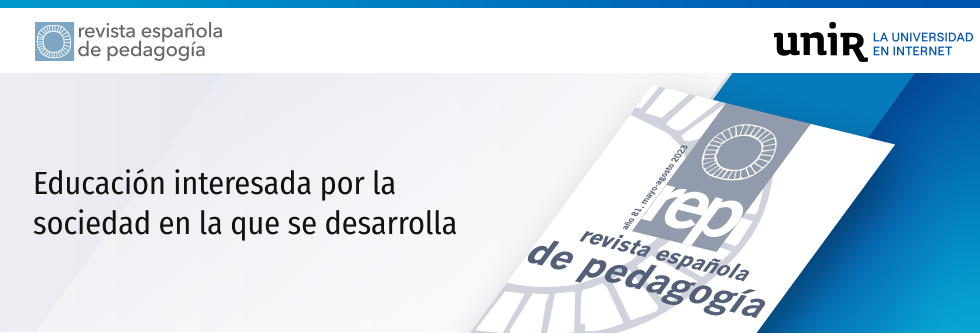DOI
10.22550/REP81-1-2023-08
Abstract
This paper presents a systematic review of scientific articles on friendship and character education (CE) published between 2007 and 2021. It seeks to identify the dominant theo- ries from which CE is approached, how friend- ship is understood in the studies, and what specific relationship is built between friend- ship and character; in other words, the extent to which it is posited that friendship can be harnessed to acquire virtues. Results indicate a prevalence of a psychological approach to CE, linked to an instrumentalist perspective on friendship, which associates it with certain benefits. However, this approach is closely followed by a philosophical–moral view that understands friendship as a good in itself and, consequently, highlights its humanizing potential. The Aristotelian framework for un- derstanding friendship and character stands out within this approach. The relationship be- tween friendship and character in the selected articles is explored through 5 categories that emerged in the analysis: 1) friendship for char- acter; 2) character for friendship; 3) friendship and transgressions; 4) teachers’ and students’ perceptions of the influence of friendship; and 5) analysis of programmes that include friendship in the curriculum.
Please, cite this article as follows: Espinosa Zárate, Z., Ahedo Ruiz, J., & Rumayor, M. (2023). Amistad y educación del carácter: una revisión sistemática | Friendship and character education: A systematic review. Revista Española de Pedagogía, 81 (284), 143-169. 10.22550/REP81-1-2023-08
Referencias | References
Arendt, H. (2013). Sobre la revolución [On revolution]. Alianza.
Aristotle. (1985). Ética a Nicómaco [Nicomachean Ethics] (J. Pallí Bonet, Trans.). Gredos. (Original work published ca. 350 B.C.E.)
Berkowitz, M. W. (1995). Educar la persona moral en su totalidad [Educating the whole moral person]. Revista Iberoamericana de Educación, 8, 73-102.
Berkowitz, M. W., & Bier M. C. (2005). What works in character education [Qué funciona en educación del carácter]. Character Education Partnership.
Berkowitz, M. W., & Bier, M.C. (2017). Toward a science of character education. Journal of Character Education, 13 (1), 33-51.
Bernal, A., González-Torres, M. C., & Naval, C. (2015). La EC. Perspectivas internacionales [The CE. International perspectives]. Participación educativa, 4 (6), 35-45.
Brooks, E., Brant, J., & Lamb, M. (2019). How can universities cultivate leaders of character? Insights from a leadership and character development program at the University of Oxford. International Journal of Ethics Education, 4 (5). 10.1007/s40889-019-00075-x
Buber, M. (1970). I and Thou. Charles Scribners. Buber, M. (2018). ¿Qué es el hombre? [What is Man?]. FCE.
Cabada, M. (1994). La vigencia del amor [The validity of love]. San Pablo.
Carr, D. (2018). Spirituality, spiritual sensibility and human growth. International Journal for Philosophy of Religion, 83, 245-260. https://doi. org/10.1007/s11153-017-9638-x
Davidson, M., Lickona, T., & Khmelkov, V. (2008). Smart & good schools: A new paradigm for high school character education. In L. P. Nucci, & D. Narvaez (Eds.), Handbook of moral and character education (pp. 370-390). Routledge.
Flick, U. (2018). An introduction to qualitative research. Sage.
Fromm, E. (2014). El arte de amar [The art of loving]. Paidós.
Gibbs, G.R. (2018). Analyzing qualitative data. Sage. Higgins, J., & Thomas, J. (2021). Cochrane hand-book for systematic reviews of interventions.
https://training.cochrane.org/handbook Hurtado, A. (2013). La educación del carácter moral [Moral character education]. Franciscanum, 55 (159), 155-197.
Ibáñez-Martín, J. A. (2015). La acción educativa como compromiso ético [Educational action as an ethical commitment]. Participación educa- tiva, 6, 18-27.
Kristjánsson, K. (2022). Friendship for virtue. Oxford University Press.
McGrath, R. E. (2015). Character strengths in 75 nations. The Journal of Positive Psychology, 10 (1), 41-52.
Noddings, N. (2010). Moral education in an age of globalization [La educación moral en la era de la globalización]. Educational Philosophy and Theory, 42 (4), 390-396.
Nussbaum, M. (2014). El cultivo de la humanidad [The cultivation of humanity]. Paidós.
Ortega,P.(2013).La pedagogía de la alteridad como paradigma de la educación intercultural [Pedagogy of alterity as paradigm of intercultural education]. revista española de pedagogía, 71 (256), 401-421.
Page, M. J., McKenzie J. E., Bossuyt P. M., Boutron I., Hoffmann T. C., Mulrow C. D., Shamseer, L., Tetzlaff, J. M., Akl,, E. A., Brennan, S. E., Chou, R., Glanville, J., Grimshaw, J. M., Hrób- jartsson, A., Lalu, M. M., Li, T., Loder, E. W., Mayo-Wilson, E., McDonald, S., McGuinness, A., ... Moher, D. (2021). The PRISMA 2020 statement: an updated guideline for reporting systematic reviews. BMJ, 372 (71), 1-9. http://dx.doi.org/10.1136/bmj.n71
Panikkar, R. (1993). La nueva inocencia [The new innocence]. Verbo Divino.
Platón. (2015). Banquete. Obras completas, vol.V [The Symposium. Collected Works, vol.V.]. Gredos.
Regmi, K. D. (2015). Lifelong learning: Founda- tional models, underlying assumptions and critiques. International Review of Education, 61 (2), 133-151. 10.1007/s11159-
015-9480-2
Rosa, H. (2019). Resonance: A sociology of our relationship to the world. Polity Press.
Rumayor, M. (2015). El Yo y la intimidad en Ortega y Gasset [Self and Intimacy in Ortega y Gasset]. Anales del Seminario de Historia de la Filosofía, 32 (1), 161-182. 10.5209/rev_ASHF.2015.v32.n1.48684
Shields, D. L. (2011). Character as the aim of education. Phi Delta Kappan, 92, 8-53.
Taylor, Ch. (2016). La ética de la autenticidad [The ethics of authenticity]. Paidós.
Citación recomendada | Recommended citation
Espinosa Zárate, Z., Ahedo Ruiz, J., & Rumayor, M. (2023). Amistad y educación del carácter: una revisión sistemática | Friendship and character education: a systematic review. Revista Española de Pedagogía, 81 (284), 143-169. 10.22550/REP81-1-2023-08
Licencia Creative Commons | Creative Commons License
Esta obra está bajo una licencia internacional Creative Commons Atribución-NoComercial 4.0.
This work is licensed under a Creative Commons Attribution-NonCommercial 4.0 International License
Palabras clave | Keywords
character education, character strengths, friendship, systematic review, virtue







